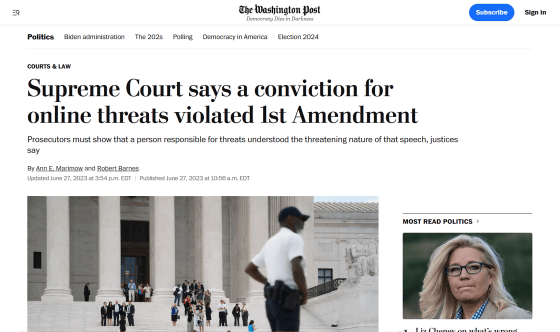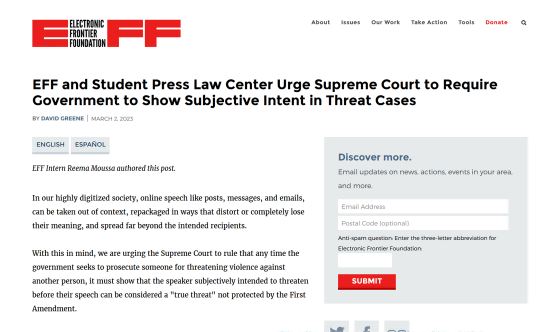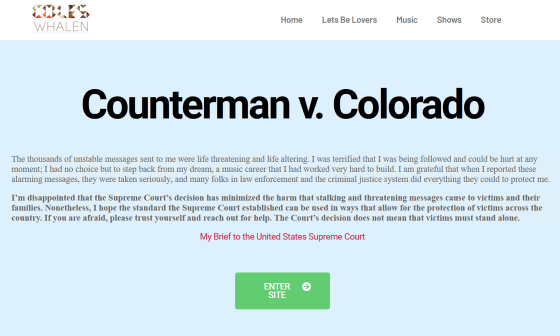The Supreme Court decides that ``the sender must be recognized as a threat'' in order for an online message to be recognized as a threat

In a trial in which a singer-songwriter woman was repeatedly sent threatening messages on Facebook, the US Supreme Court said, ``For the message to be recognized as threatening, the sender must be ``this is threatening''. I must subjectively recognize that,' he overturned the lower court's conviction. The Supreme Court's decision has been criticized, saying, ``It will be difficult to convict criminals of internet stalkers,'' and ``Stalkers who are obsessed with delusions will be protected.''
Supreme Court says a conviction for online threats violated 1st Amendment - The Washington Post

Supreme Court clarifies when online harassment can be prosecuted | CNN Politics
https://edition.cnn.com/2023/06/27/politics/supreme-court-ruling-counterman-v-colorado/index.html
Supreme Court makes decision on Counterman v. Colorado | 9news.com
https://www.9news.com/article/news/politics/national-politics/supreme-court-convict-making-threat/73-32fadd43-5138-4acb-b872-aaee969e200f
Supreme Court guts protections for cyberstalking victims
https://www.fastcompany.com/90915726/supreme-court-guts-protections-for-cyberstalking-victims
In 2014, a man named Billy Counterman began sending threatening messages to singer-songwriter Coles Whalen via Facebook. Mr. Waylen, who was sent hundreds of messages including rambling delusions and net memes, responded by blocking Counterman's account without replying, but Counterman created a new account. He said he continued to send messages for two years.
Messages sent by the counterman included hints of stalking, such as, 'Were you in a white jeep?' It also included things. Threatened by these messages, Mr. Waylen was forced to hire bodyguards, cancel concerts, and sometimes panic attacks when he felt that there was a counterman in the audience. I told the Washington Post daily.
Ultimately, Mr. Waylen consulted law enforcement about these messages, and Counterman was arrested and charged with stalking. Counterman, who has also been convicted of threatening other people, was sentenced to four and a half years in prison in Mr. Waylen's case.
Most messages and claims in the United States are protected as
However, Counterman's attorney, John Elwood, argued that Counterman was suffering from mental illness and did not recognize that the message to Mr. Waylen was one-way and threatening. 'The underlying principle of the First Amendment is that the government must not ban the expression of an idea, even if society finds the idea itself offensive or objectionable,' Counterman said. I have appealed to the Supreme Court that the message does not constitute a genuine threat.
Mr. Elwood's claim has also been endorsed by the Electronic Frontier Foundation (EFF) , which defends the freedom of the digital space, and the Student Press Law Center, which defends the rights of student journalists.
EFF and Student Press Law Center Urge Supreme Court to Require Government to Show Subjective Intent in Threat Cases | Electronic Frontier Foundation
https://www.eff.org/ja/deeplinks/2023/03/eff-and-student-press-law-center-urge-supreme-court-require-government-show

On its official blog, the EFF pointed out that in the online space, text such as messages and emails can get out of the original context and spread beyond the sender's intention. Of course, dangerous speech should not be tolerated, and while acknowledging the need to make an exception for genuine threats, he argues that the definition of a true threat that is not protected by the First Amendment should be narrow. increase. If true threats become widely applied, speech such as humor, art, and social satire may be seen as threatening, and speech and reporting may atrophy.
The EFF therefore said, 'We are asking the Supreme Court that when the government seeks to prosecute someone for threatening others with violence, it is a 'genuine threat' whose speech is not protected by the First Amendment.' We ask that it be determined that the speaker must be subjectively shown to have intended to make a threat before being considered.'
And on June 27, 2023, the Supreme Court ruled, ``To qualify a message as a true threat, it must be proved that the sender recognized his words as ``possibly perceived as threatening''. I have to' (PDF file) Judgment was made with 7 in favor and 2 against. This will remand the trial to the lower court, and the prosecution will be required to prove ``whether the counterman was aware that his message could be threatening.''
Supreme Court Justice Ellen Kagan said, 'State authorities prosecuted Counterman according to objective criteria and did not show that Counterman himself perceived the remarks to be threatening. This is constitutional.' It's a violation of the First Amendment,' he said.
Meanwhile, Judge Amy Barrett, who opposed the ruling, said, 'Imagine someone who threatened to 'bomb the airport.' It may be forbidden, but from today onwards, such an order cannot be issued without proof that 'the person who threatened was expected to cause terror,'' narrowly defining true threat. I object that this makes it difficult for law enforcement agencies to deal with it.
'A paranoid speaker may lack awareness that their remarks are threatening, and a crafty speaker may strategically abandon awareness,' Barrett said. Lucky speakers may not leave evidence that would put them at a disadvantage,' he said, arguing that it would also have a negative impact on cracking down on stalking cases.
Colorado Attorney General Philip Weiser said in a statement that the ruling would create a loophole for delusional and crafty stalkers, making it more difficult for them to stop them from tormenting their victims. 'In short, the ruling encourages victims of intimidation (mainly women) to refrain from speaking out against stalkers, as they believe there is little they can do to hold stalkers accountable,' Weiser said in a statement. and more likely to live in fear,' he commented.
Mr. Weiren has also released a statement on the official website in response to this Supreme Court decision. 'Thousands of messages sent to me were life threatening and life changing. I feared I was being followed and could be harmed at any moment. I I was forced to take a step back from my dream - a music career that I had worked so hard to build.' 'Disappointed that the Supreme Court's decision underestimated the harm that stalking and threatening messages can do to victims and their families. But I hope that the standards established by the Supreme Court are used in a way that protects victims across the country.If you feel scared, believe in yourself and ask for help.Supreme Court 's decision does not mean that victims have to face it alone.'
Counterman v. Colorado - Coles Whalen
https://www.coleswhalen.com/

Related Posts:
in Note, Posted by log1h_ik







